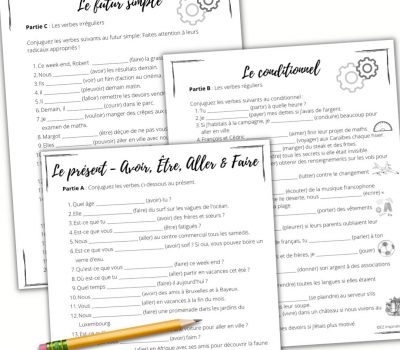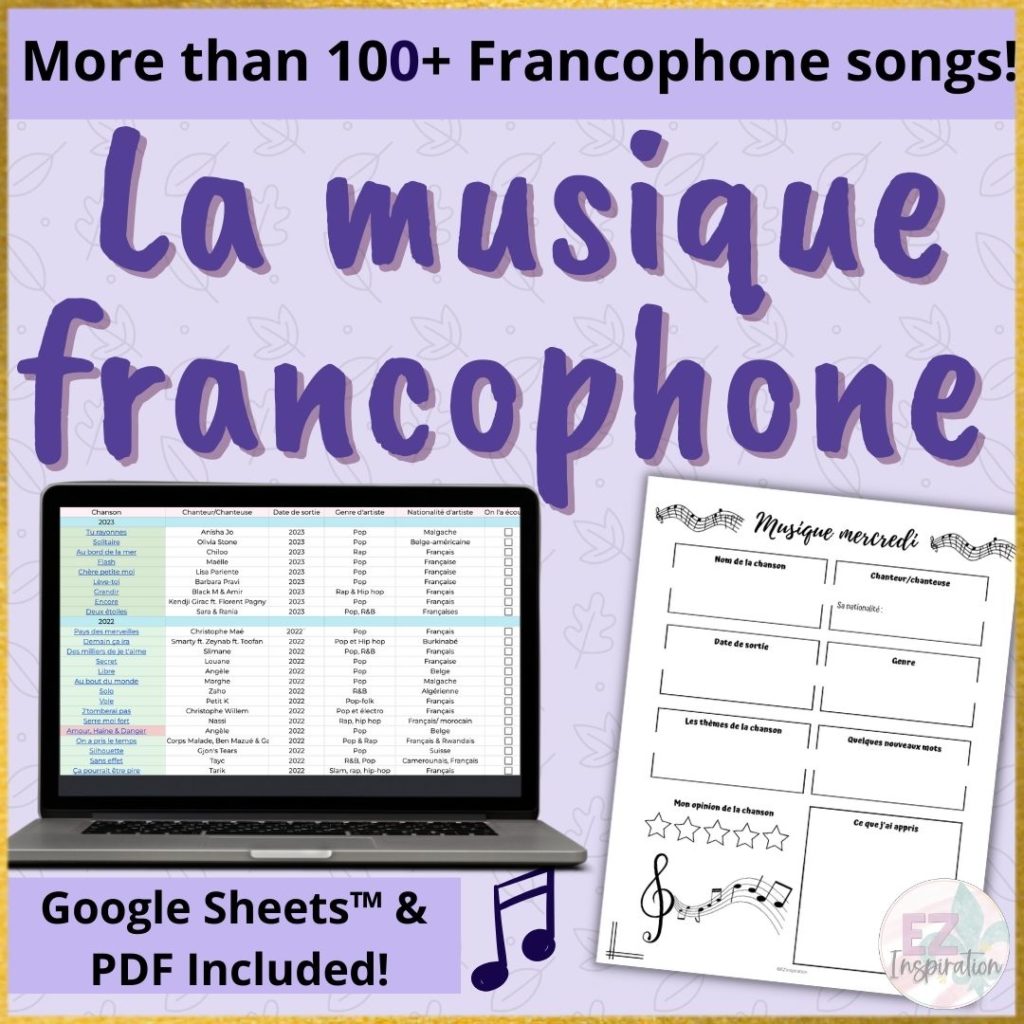
Integrating francophone music in the classroom is a dynamic and impactful approach to language learning and cultural immersion. Music has the capability to engage students on a profound emotional and cognitive level, broaden their global perspectives and cultural appreciation, and enhance their language proficiency at the same time. In this blog post, we’ll dive into the captivating world of francophone music and its transformative potential within the French classroom.
Why Francophone Music Matters
French music is a great way for students to explore the diverse francophone cultures around the world. As French educators, we aim to not only teach the language but to also immerse students in its vibrant, diverse, and rich culture. Francophone music, with its emotional depth and cultural nuances, serves as a powerful tool to enhance French proficiency by facilitating a connection between learners and the language.
The rhythm and cadence of French songs also provide an informal guide to pronunciation and grammar, helping students grasp the nuances of the language. The lyrics often introduce students to idiomatic expressions, slang, verb tenses, and rich vocabulary in context, making language acquisition both dynamic and memorable.
In addition, listening comprehension is a fundamental component of language learning. The initial step in acquiring a language involves listening before gaining the ability to speak it. By exposing students to a variety of francophone musical genres, learners can understand different regional accents, speeds, and tones, which serve as the critical steps for language development and comprehensive language proficiency.
Incorporating Francophone Music in Your French Classroom
Musique Mercredi
Showcase a new French song every week in your French class! Set aside the first 5 minutes every Wednesday and introduce your students to a new francophone song. Feel free to show the music video but be prepared to watch it ahead of time so that you can ensure that it is appropriate for your students. After watching the song, encourage students to form an opinion and ask them if they liked it. If your students are more advanced, get them to explain why they enjoyed or disliked the song.

When choosing songs, it is important to highlight different genres as not all students like the same music. There are many different musical genres to consider such as: pop, rap, country, R&B, electro, rock, etc. and I guarantee that you will be able to find a French singer that resonates with each student if you diversify the francophone music genres weekly. You should also feature artists from different cultural backgrounds. Not every francophone singer is from France. Research some francophone singers from various French speaking regions such as Congo, Québec, Belgium, Switzerland, Togo, etc. and immerse your students in the beauty of la francophonie.
2. Manie musicale
Manie musicale is an annual French song competition in March, where students vote on their favorite French songs from a field of sixteen. Each year 16 new songs are chosen from French-speaking singers around the world. The songs are all current popular francophone music that are appropriate for Intermediate and Senior French students. Students from schools all over the world participate, voting on their favorite song of each round of the competition, until one song is left… the winner! This is a great opportunity for students to gain cultural insights and enhance their French language proficiency. Be prepared to engage your students all March long!
Interested in participating? Check out the Manie Musicale Facebook Group or check out their official website.
3. Exploring Themes Within Your Unit of Study
Another way that you can add some extra flavor to your units is by choosing francophone songs that target the themes you are discussing in class. For example, if you are looking at a certain theme (ex. L’amour, l’éducation, les réseaux sociaux, la discrimination, la nature, etc.), find a song that highlights that specific theme. You can present learners with pre-listening activities such as discussing relevant vocabulary, making predictions about the song based on the title, or a reading comprehension activity on the artist in order to enhance their understanding. Students can then listen actively to the song, pay attention to the lyrics, melody, and its mood. While listening, they can jot down words or phrases that stand out to them. Afterward, they participate in a lyric analysis, where they explore the meaning of the lyrics and the overall theme(s) of the song.
If you choose to target themes with francophone music, encourage your students to reflect upon the theme and give their personal opinion on the song. Some question prompts that you can use:
- Est-ce que vous avez aimé la chanson ? Pourquoi ou pourquoi pas ?
- Quel est le thème de la chanson ?
- Est-ce que le thème est puissant pour vous ? Expliquez.
4. Exploring a French Grammatical Concept
When introducing grammar concepts to students, it is important to find authentic ways for them to see the grammar in action. Using French music to target grammatical concepts and verb tenses is a creative and engaging way to reinforce language learning.

Firstly, you will want to highlight the grammatical concept that you want to target (Ex. le passé composé, le futur simple, la négation, etc.). Then you can choose a francophone song that has that specific grammatical concept within its lyrics multiple times. You can then print off the lyrics for the students and have them identify the grammatical concept with a highlighter or pen and conduct a class discussion on where the grammatical concept is used in the song and what it illustrates. Afterwards, you can play the song or show the music video to students and they will be able to explore the narrative presented in the song and understand how the concept was used to convey a specific meaning.
5. Celebrating Francophone Culture
Feeling creative? Organize a “Francophone Music Festival” in your classroom. Let students explore and present songs and artists from different French-speaking regions around the world! Each student selects a francophone song and researches the artist, the song’s themes, message, and powerful lyrics. They then have the opportunity to share their song at the “music festival” and share their findings with the class. This event could foster an appreciation for the diverse musical landscape of the francophone world and introduce your students to new singers and francophone music that will have them wanting more.
Feeling brave? Transform your classroom into a vibrant festival space. Decorate with flags, posters, and images representing the francophone world and its diverse singers. You could also incorporate francophone cultural dishes that allow students to explore the culinary aspects of the diverse francophone cultures around the world.
6. Lip sync battle!
Hosting a lip sync battle in your French class is a fun and engaging way to encourage language learning and creativity! First, you will want to select a couple of French songs that have catchy lyrics. Ensure that these songs are age-appropriate for your students. You can then provide the song options for students or allow them to choose their own French song. Then introduce the lip sync battle concept to your students. Emphasize that they will be “judged” not only on their lip-syncing skills but also on their creativity, stage presence, and enthusiasm. They will want to convey the emotion of the song throughout their performance. Choose a date for the lip sync battle and give students time to prepare and practice their song. You will want to assist students with pronunciation and ensure students feel confident with their performances.

On the day of the lip sync battle, you could set up a stage for the performance atmosphere. Each student will have the opportunity to do their performance and celebrate the efforts of each learner or group. Feeling generous? Feel free to give out prizes and pick winners for different categories (ex. The best performance, the most dramatic performance, the best costume, etc.). This lip sync battle will not only enhance language skills but also make a memorable experience for both you and your students!
Conclusion
In conclusion, francophone music is a powerful instrument for French teachers and will ignite your classroom and motivate students to learn the language! Moving forward, I would encourage you to create a curated playlist that spans various genres, artists and themes. The diversity ensures that students will be exposed to different linguistic nuances, cultural expressions, and perspectives, offering students a comprehensive language experience.
Feel like this task may be a little daunting? Try out my Ultimate French Music List with over 100+ francophone songs! I’ve spent many hours putting these modern French songs into an editable Google Sheet, where you will find each francophone music video, its YouTube link, year release date, song themes, artist, genre, and other applicable notes. This is the perfect playlist for Intermediate and Senior French students and continually receives frequent updates.

P.S. Have a favourite French song you always show your French students? Let me know in the comments below!
P.P.S. In need of other activities to enhance your students’ oral comprehension skills? Check out this blog post: Five Fabulous French Websites for Focusing on Listening Skills.

